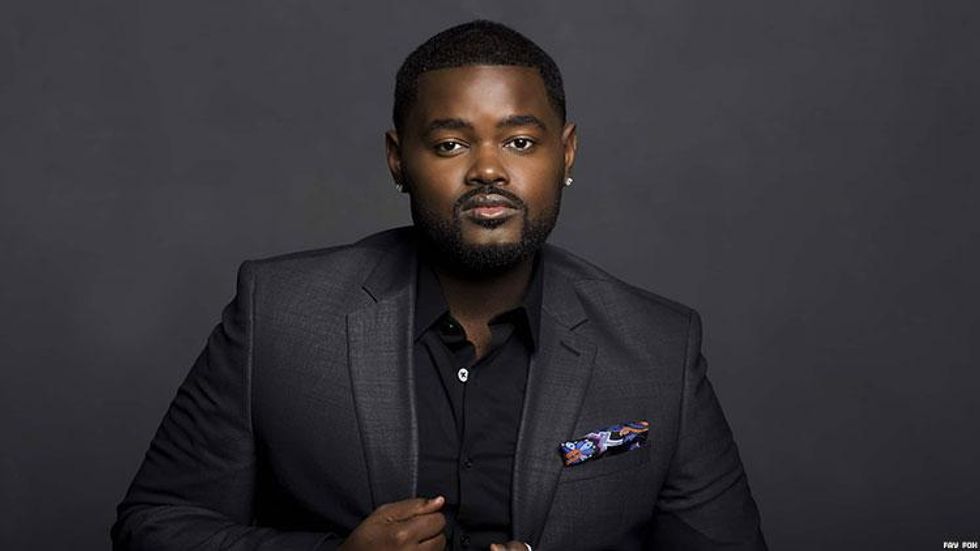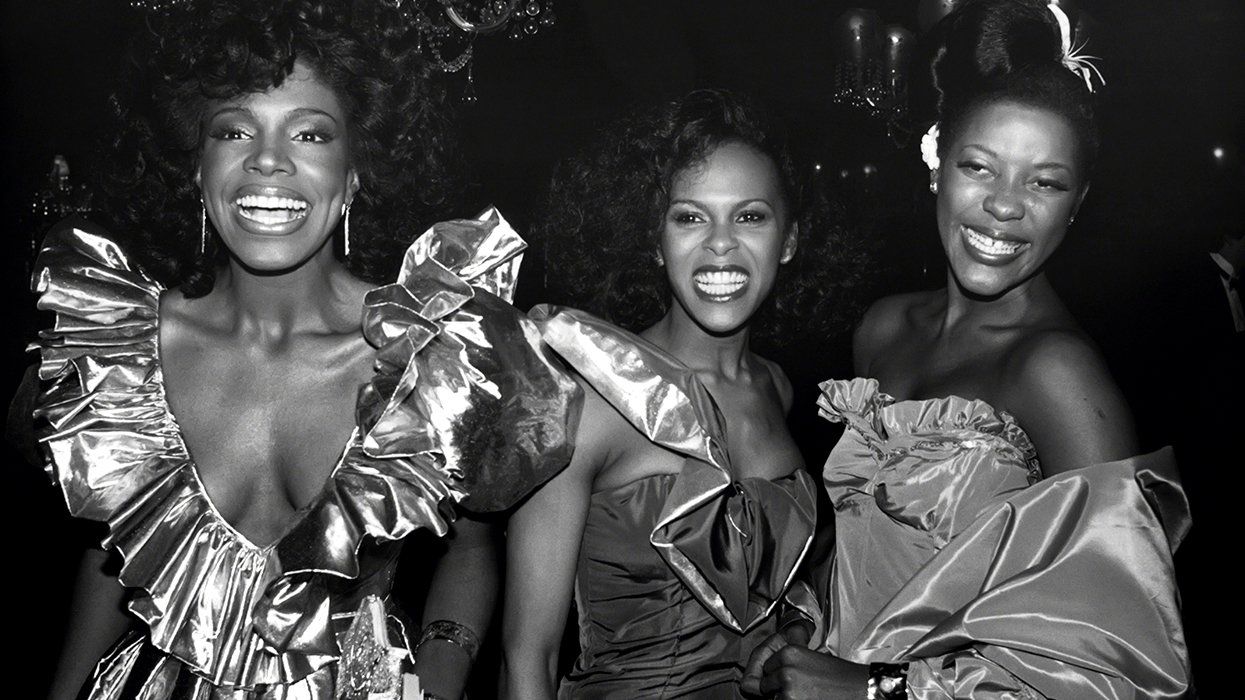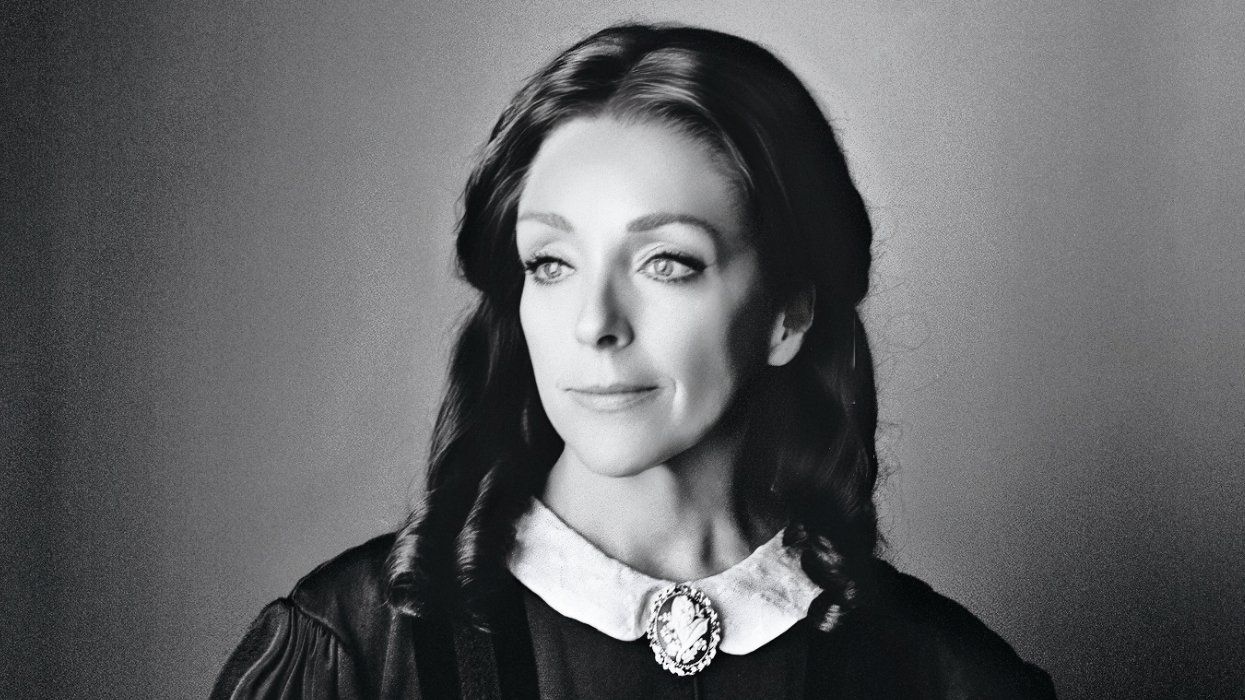In ancient mythology, Orpheus was a musician whose beautiful voice and lyrical talent convinced the gods to return his dead wife, Eurydice, to the world of the living. In Eurydice, a new opera by composer Matthew Aucoin at the Los Angeles Opera, that voice belongs to a gay Black singer, John Holiday.
Holiday, a 34-year-old countertenor -- the highest register for a male singer -- has a unique role in the production at the Music Center's Dorothy Chandler Pavilion. He portrays Orpheus's Double, who sings onstage alongside the performer cast as the mythical figure, Joshua Hopkins, in order to imbue his music with an ethereal element.
One of Holiday's primary tasks in Eurydice was diving into the nature of this role. The performer sees a dual role for his character. He is a "supernatural being that that speaks for Orpheus when Orpheus can't say something or when Orpheus wants to say something on a heightened level," Holiday says. Yet he is also an ally whose presence reminds Orpheus, "I've got your back. You don't have to do it alone. I'll help you."
It was always a dream of Holiday's to work with Aucoin, a composer who at 29 has been hailed as a rising star in the world of classical music. Holiday had asked his manager to directly reach out to the 2018 MacArthur Fellow for Eurydice, a hotly anticipated production that, after Los Angeles, will move to the Metropolitan Opera in New York City. Aucoin was happy to have Holiday, a Juilliard alumnus and award-winning performer who has graced the stages of the Met and a Jason Mraz concert alike.
"The word 'genius,' I think, is very fitting for him," Holiday said of Aucoin. "I think he knows exactly what he wants. He has written this beautiful work that I think really speaks to people on so many different levels."
However, in addition for the opportunity to work with Aucoin, Holiday was motivated because he has a special place in his heart for the L.A. Opera. He made his debut there in 2014 playing a female witch in Dido and Aeneas and has long been supported by the company. "When they offered me this role, I was excited to know that it would be at L.A. Opera because I love this city and the opera company so much," Holiday said.
The story of Orpheus and Eurydice is as old as the ancients -- both Virgil and Ovid rhapsodized it -- as well as the art form of opera itself. Jacopo Periand and Giulio Caccini wrote Euridice in 1600. Orfeo by Claudio Monteverdi followed in 1607. The myth continues to be a perennial in the classical world. Matt Morris's Orfeo ed Euridice recently closed at the Met and Hadestown, inspired by the story, is still lighting Broadway on fire. In film, an entire scene from the modern French masterpiece Portrait of a Lady on Fire is dedicated to the recitation and critical analysis of the myth.
The reason for this longevity? The story of "love and loss" is one that transcends place and time, said Holiday. The ending -- Orpheus leads Eurydice to the doorstep of the living, only to defy the orders of the god Hades to look back and lose her once again -- is an unbearable tragedy that still resonates.
The desire to bring a loved one back from the dead is also universal. If Holiday, using his voice, could accomplish this feat, he would bring back his father. "It was unexpected," Holiday said of the passing of his father, who died in 2014. "I don't have any voice mails or any video recordings of my father. So I long to hear his voice. ... I miss him terribly."
Although the myth persists, it has also taken on new meaning for different generations. Sarah Ruhl brought a woman's story out of the shadows when she wrote her 2003 play Eurydice; the 46-year-old playwright wrote the libretto to the opera, which is scored with Aucoin's music. "It's really beautiful to see how Sarah Ruhl has used her voice to give power to women," Holiday marveled. The opera is also brought to life by a woman director, Mary Zimmerman.
The recentering of an ancient story from a woman's point of view comes in the midst of a revolution in the entertainment industry, in which historically marginalized people are demanding to be heard and seen. This call for diversity is also impacting the classical world -- albeit at a different place.
"It's a little slower than the other industries," Holiday attested. "We are dealing with music from 16th century, 17th century, 18th century, which are a part of a canon. What's been beautiful to witness [though] is that we're seeing that the opera world is starting to take that on. They're addressing it with a quickness. There's a desire to see many more stories being told."
Holiday, as a Black gay man, has yet to see himself reflected in an opera -- but he is proud of the work he is doing toward diversifying that landscape. In 2017, he portrayed a Black transgender man in We Shall Not Be Moved by composer Daniel Bernard Roumain, director Bill T. Jones, and librettist Marc Bamuthi Joseph. He also spoke with excitement about an upcoming project centering on a gay African-American icon -- details to come.
In his career, Holiday has also never been closeted -- a resolution he made to himself as a teenager. "I can remember writing in my yearbook from high school a quote that says, 'I would never compromise my being in order to be successful, for that would truly not be success,'" he recounted. "What I've always lived by in my life is being the most authentic John Holiday that I can be."
That journey hasn't always been easy. Holiday grew up in the greater Houston area in a religious household -- his grandmother was his church's minister of music, and he began singing in its choir at age 2. When he came out to his mother as a teenager, he did so with the expectation that she would turn him out of the house. Tearfully, he told her so.
"She said, 'Why would he need to pack your bag? ... I love you. And I actually, I went through however many hours of labor pains with you. You're still my child. And while this might be difficult for me, I love you no matter what.'"
Since then, "my mother has been one of my most ardent supporters," attested Holiday -- as has his grandmother, who he came out to at age 25. But as it turns out, his grandmother already knew. As a child, Holiday would try on her heels in secret. But as he learned in his conversation with his grandmother as an adult, he returned the shoes to her closet in the wrong order.
"I never said anything to you about it because I knew that when you were ready that you would come to me," she told him. "I don't care what you do and who you love. I love you like you are my son and I will love you until the day I die."
Holiday became emotional discussing the support of his loved ones. "I've been very lucky to have a family who has been behind me 150 percent," he said. "Because of that love, they liberated me into being and I'm so thankful for it."
His peers weren't always so accepting. As a child, Holiday was teased for the high pitch of his voice. But even in those days, he had a clarity of vision regarding its power. "I've always believed since I was a young kid that music was a part of my life and that I am music, if that makes sense," he said. "Music is just in my being and that is a natural part of who I'm supposed to be. So I never let someone's chastising of me or making fun of me [stop] me from being who I am."
"I've never equated the pitch of my voice to my masculinity. If you think of older singers like Frankie Lymon or Frankie Valli, their masculinity, as far as I know, was never really questioned. So I myself never thought about it," Holiday added.
Ultimately, Holiday wants that voice to reach other LGBTQ people and people of color, so they also know that they can belong in the world of opera.
"I hope that when people see me on the stage that they know that they too can do this," Holiday concluded. "I hope that they see themselves in me. I hope they know how I love music and how much I appreciate them for helping to catapult me to the visibility that I have right now. I'm so thankful for all of their love, support, and encouragement of me throughout the years."
"I'm thankful without ceasing for every single moment to get up on the stage."
Eurydice runs until February 23 at the L.A. Opera. It will open at the Metropolitan Opera in fall 2021.
















